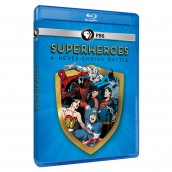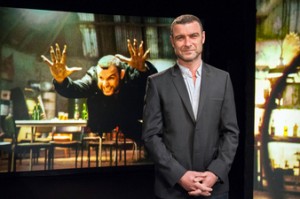SUPERHEROES: A NEVER-ENDING BATTLE is a three-hour documentary on comic books and the culture they’ve created that airs Tuesday October 15 on PBS.
Documentarian Michael Kantor says, “We made this series so that no parent would ever throw out their kids’ comic books again. This series is not just for comic book geeks – it’s funded both by the National Endowment of the Arts and the National Endowment of Humanities, and it contextualizes the stories of comic book superheroes within the greater history, that of the Great Depression, World War II, the congressional witch hunts of the 1950s, the Watergate era, the malaise of the Carter administration, the Reagan/Thatcher era, and even President Barack Obama’s love of SPIDER-MAN. This is the kind of program … hosted and narrated by Liev Schreiber, [which] can only be done on PBS. Our aim is to explore how these characters came into creation and what they reflect about America.”
Kantor and his team have assembled a group of comics creators to talk about their work, both in the documentary and for the Television Critics Association. These include Len Wein, who first brought forth Wolverine for THE X-MEN, Gerry Conway, who invented the Green Goblin for SPIDER-MAN and Todd McFarlane, who not only brought SPAWN to life – first as a comic, then as a film, an animated HBO series and multiple video games – but also co-founded and is president of Image Comics, which is the publisher of Robert Kirkman’s series THE WALKING DEAD, among other titles. Image is famous for both its convention-breaking output and for its deals that allow creators to retain rights to their own work, rather than having the publishing house take those rights.
McFarlane makes himself available for further conversation after the main Q&A panel is concluded. The subjects are wide-ranging, from what may be happening now with SPAWN to the workings of the comic book industry.
AX: You had a classic book film adaptation in the works for awhile …
TODD McFARLANE: Michael Bay and I did a pretty ambitious reboot of WIZARD OF OZ that we had sold to Warner Brothers that they kept and eventually it just lapsed, so those rights are back on my side. It was, “How do I get college kids to go to WIZARD OF OZ?” and the answer is, “We’ve just got to make it cool as hell.”
AX: Is the time right to bring SPAWN back as a new feature film?
McFARLANE: Yeah. I’m hoping to have the script done hopefully in the next couple of months. I’ve talked to a couple of producers – can we get shooting by the end of the year if I can get that script in good order? But it’s a complete reboot. It’s a ten-million-dollar, R-rated supernatural movie that takes all the superhero stuff out of it. So for people who want to go see an IRON MAN redo, that’s not it. For people who like THE CONJURING, then it’s going to be right up that alley.
AX: Will it be a horror film?
McFARLANE: Not “horror.” Because that’s a weird word, right? Supernatural thriller. I grew up on things like ROSEMARY’S BABY and THE OMEN, things like that. Those movies only had one fantastic element in [them], and it was the supernatural or the ghost, and everything else in the world was normal. With superheroes, you have to have the hero, the super-villain, the fantastic headquarters, sometimes even the sidekick and you get more and more fantastic. This is just going to be THE DEPARTED and L.A. CONFIDENTIAL with a ghost moving around in it.
AX: Did you feel that the 1997 version of SPAWN, with Michael Jai White in the title role, did work but just came out at the wrong time, or did you feel that there were problems with it that you want to correct this time?
McFARLANE: I mean, we had a first-time producer, first-time director, first time I was involved, and so we did as good as we could, given the inexperience that we had. So I thought on a scale of one to ten, it was a five. It probably would have done better if it had come out in the midst of all the superhero stuff, because we were sort of a little bit ahead of the curve, and some of the special effects weren’t quite up to the standards that they are right now, so it was what it was. I wasn’t in charge. Would I have made some changes? Absolutely. I made a deal where I let other people do it. So the next one will be the small-budget one. What when I go to meetings [about SPAWN], there is only one non-negotiable. I write, produce, direct. And the only way you’re going to say “Yes” is if we keep the budget down and I deliver this R-rated, cool – because I’ve had way more people say they enjoyed the HBO version, which was a little bit darker and grittier, than the PG-13 film.
AX: Jamie Foxx has been talking about how he wants to play Spawn. Do his involvement with SPIDER-MAN affect that?
McFARLANE: No, no, no. You know, Jamie was out at my office. I thought we were going to keep it on the q.t. I’ve talked to some pretty high-profile actors. I think he’s just putting the pressure on me to get the script done. So I sold him on my pitch. I go, “Here, I’ve got an idea that could keep you in the SPAWN movies for twenty years, but it can’t be about physicality. It has to be more about a little bit of acting and then this specter, this sentinel, that moves around in an otherwise hard drama movie.”
AX: Now, WALKING DEAD is a very popular comic, but it doesn’t fit the “superhero” mold …
McFARLANE: This title here [of the documentary] is SUPERHEROES. WALKING DEAD is a great example of, just come up with a good story. Robert Kirkman the creator will tell you, “It’s not really a zombie story, it’s really about the id of the human being – what happens if you take away electricity and gas and everybody’s fighting for the same limited amount of resources now, right? So we see it before – people cut in line because they want to find a shortcut, and so what happens if you’ve got a family of three? He’s got a family of three, there’s one gallon of milk and he’s got a gun and I don’t. Who gets it, right? Oh, and by the way, there are some zombies that are coming in about five minutes. They don’t move very fast.” Here’s the reason that I think THE WALKING DEAD works, is because the zombies are just catalysts to show sort of the true nature of man – good, bad or indifferent – when you put him in extreme situations.
AX: How have you guys at Image been able to become successful publishing so many diverse genres of comic books?
McFARLANE: It’s interesting, because somebody just handed me a copy of the 20 YEARS OF IMAGE documentary. It was way better than I thought. And it shows that we started as this band of superhero artists who just took what we were already doing – we went, we did it, it sort of had its natural bell curve, we had a little bit of internal fighting and then all of a sudden, the salvation was, instead of trying to compete head to head with Marvel and DC, we said, “Let’s actually do what they’re not doing, which is to be as eclectic and as sort of open-door policy as possible, so that you could have books like CHEW and THE WALKING DEAD, and SAGA now, sci-fi, that can be some of your biggest titles, and the superhero ones, that were driving it two decades ago, are no longer at the helm.” So I like it. So in other words, the superhero stuff, when you’re tired of it and you’ve got another idea, Image is your place. Bring your ideas to us.
AX: You’re also able to sell these unusual books …
McFARLANE: Because there’s a system it goes through. We don’t take everything. Just because you bring us something, we don’t take it all. So we’re selective and either the actual theme of what the story is and/or the creative people – because there are Hollywood people that come in andHollywood writers that come in, and they’re like, “Oh, this is cool, nobody rewrites my stuff. It doesn’t take five years of development, I just write it and you print it, this is cool.” So that combo is very appealing to people and I think we’ve got a keen eye.
AX: Is there a hierarchy between your writers and your artists?
McFARLANE: No. To get a comic book done, the way that it works is, the writer writes a full script – they didn’t in my day, but they do now – they hand it to a penciler. The penciler takes the script and breaks it down into drawings, using pencil. They hand it to an inker, who’s the third guy down the conveyor belt. He does the inking on it. People call them “tracers,” which is a disservice to them. Then you give it to a letterer, who puts in the word balloons, and when all of that’s done, then you hand it to a colorist, and the colorist colors it, and then you send it off at that point to the printer and you’ve got yourself a comic book. There are usually five people.
AX: So is the penciler the person who decides what a given character looks like?
McFARLANE: Yes. Well, it depends if there’s a description. But who’s the most popular depends on what you’re getting out of the book. So if you think it’s a great story, and you’re going, “I don’t care about the artwork,” obviously, you think the writer is more influential. There are some books where the writing is okay, but the art is dazzling, and that’s what keeps the sales [up]. So depending on what’s going there – I’m biased, I think Shakespeare with a stick-figure artist doesn’t sell as well as an average writer with Michelangelo. I’m biased – fifty-one percent is the art. It’s a visual medium.
AX: What comics are you personally working on now?
McFARLANE: Well, mine is SPAWN, and then I’ve got another one I co-created with Robert Kirkman, creator of WALKING DEAD, called THE HAUNT. A lot ofHollywood people have been talking about that one.
AX: What are you most proud of with Image Comics?
McFARLANE: The thing I’m most proud of about Image Comic Books is just showing good creative people other possibilities. So if you want to do CAPTAIN AMERICA, go ahead, knock yourself out, do it. But if you think that there’s no way that you can create your own character and do it independently and lead a good life with solid finances, then you need to come knocking on my door or Jim Lee’s door or now Kirkman’s door, the new example who blew us all out of the water. Lightning keeps striking and the possibility is still there for you to create the next big guy.
Follow us on Twitter at ASSIGNMENT X
Fan us on Facebook at ASSIGNMENTX
Article Source: Assignment X
Article: Interview: Todd McFarlane on SUPERHEROES: A NEVER-ENDING BATTLE
Related Posts:












